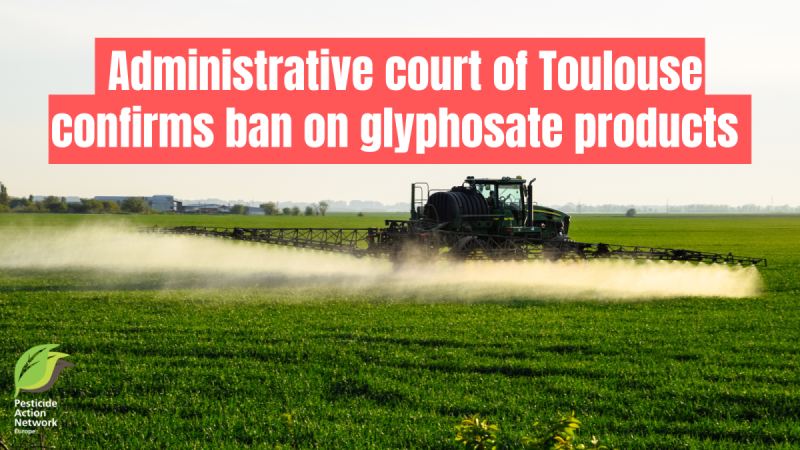The French Administrative Court of Appeal in Toulouse confirmed the earlier ruling to cancel the renewal of two glyphosate-based products. In April 2025, the judges concluded that the authorities had failed to properly assess the risk these products pose to the environment, as required by law.
In September 2020, the French Agency for Food, Environmental and Occupational Health & Safety (ANSES) renewed the authorisation granted to Syngenta France in 2007 to sell Touchdown Système 4 and Touchdown Forêt, two glyphosate-based products.
Our member, Générations Futures, asked the Montpellier administrative court to cancel these renewals. They argued that they infringed Article 29 of the Regulation of 21 October 2009 on the safety of pesticides. In their view, the absence of harmful effects of glyphosate on human health and unacceptable effects on the environment, such as on vertebrates and terrestrial arthropods, had not been demonstrated. The court ruled in their favour on 12 May 2023.
ANSES lodged an appeal against the decision. Syngenta France joined the appeal. In their view, ANSES had reached its decision on the basis of a complete dossier and assessment, taking into account the reliable scientific data available, and that the requirement to pay particular attention to the risk to the diversity and abundance of terrestrial vertebrates and arthropods was not a condition for granting marketing authorisation.
The appeal court noted that the company had not provided any information to assess the risk posed to the diversity and abundance of these species. Therefore, ANSES had not paid particular attention to the risk of an ‘unacceptable’ effect on the environment, which makes the authorisation contrary to legal provisions.
The harms of glyphosate to health and the environment are well-documented in many studies. Glyphosate is the world's most widely used weedkiller. Its extensive use pollutes water resources and degrades soil health. Glyphosate and its breakdown products are omnipresent and can be detected in the blood and urine of most humans. Studies by independent scientists show that it is toxic in many different ways: it disturbs our gut microbiome, can damage DNA and lead to cancer, cause liver and kidney toxicity, and may cause neurotoxicity as it has been linked to Parkinson's disease and cognitive disorders in children. Visit www.stopglyphosate.eu for an overview.
Banning glyphosate-based herbicide at national level
Even though the active substance glyphosate is authorised in the EU, despite the scientific evidence indicating it causes harm, the law allows Member States to ban glyphosate-based products at national level. Luxembourg and Austria tried to do so, but used the wrong legal basis and were unsuccessful. Others restricted the use of glyphosate-based products in public spaces and/or non-professional users.
Following the 2023 renewal of glyphosate at EU level, PAN Europe produced a guidance document to serve as a non-exhaustive ‘handbook’ for Member States. It details the legal provisions under the EU Pesticide Regulation to either ban or severely restrict the use of glyphosate-based herbicides at the national level. It first provides a summary of the scientific evidence indicating that glyphosate-based herbicides fail to meet the EU law’s requirements for the authorisation of pesticide products. Next, it explains the legal avenues of how Member States interested in banning glyphosate-based products in their country can:
- Refuse the authorisation or re-authorisation
- Review, at any time, and withdraw a national authorisation
- Ban specific uses or restrict the conditions of use of glyphosate-based herbicides by performing a comparative assessment
Court case against the EU glyphosate re-approval
In 2023, the European Commission gave the green light to 10 more years of the active substance glyphosate. PAN Europe and its members are convinced that the re-approval is a violation of the EU Pesticide Law, which says that the protection of health and the environment from pesticides should come first. In case of substantial doubt, the precautionary principle must be applied. Therefore, to protect people’s health and the environment, and their right to a healthy future, we’re challenging the decision by the European Commission and Member States to re-authorise glyphosate for another 10 years before the European Court of Justice.
Read more:
